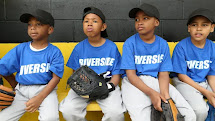Erykah Badu Makes Her NYFW Styling Debut
Erykah Badu & Pyer Moss AW16 show on Feb. 13, 2016 at
Milk Studios, New York.
At the start of a new season, designers typically put together what’s
known as a moodboard -- a collage of old photographs, postcards, fabric
swatches, color samples and other mementos that influence the
aesthetics of a new collection. There’s comfort in knowing why something
is the way that it is, in tracing origins -- and these
moodboards always manage to offer up an easy and clear explanation to
the question fashion journalists ask first: “What was your inspiration
this season?”
The New York native who got his start interning with Kay Unger at 14 and then Marchesa at 16 made headlines last September for a collection that interwove themes of police brutality and the Black Lives Matter movement into the clothing. There was outerwear with blood-spattered patterns and footage from the deaths of Eric Garner and Walter Scott that played in the background -- mixed medium statement pieces that plunged into a political conversation the overwhelmingly white industry isn’t used to having. (The New York Times reported in 2015 that black designers composed 2.7 percent of labels showing at NYFW.)
“Truth and honesty is what compels me to design,” Jean-Raymond, who founded the label in 2013, says. “I feel a responsibility to be myself, to be completely relevant in my thoughts and my emotions and not give into societal pressures. If something is bothering me, I’m going to talk about it.”
On Saturday, the focus was mental health. While a quintet and chamber group performed operatic versions of Fetty Wap’s “RGF Island” and Future’s “Trap N----,” the designer explored the notion of “double bind” -- a theory first proposed by anthropologist Gregory Bateson that describes a situation in which a person is confronted with two irreconcilable demands that can sometimes lead to depression. Mixed in with the oversized wool coats, trousers and structured turtlenecks were sweatshirts listing symptoms that require medical attention (panic attacks, anxiety, hallucinations). At the very end of the show a model dressed in a sky-blue denim button-down carried a sign that read “My demons won today / I’m sorry,” a reference to the last statement Black Lives Matter activist MarShawn M. McCarrel II posted on Facebook before committing suicide last week.
There to help bring Jean-Raymond’s vision to life was Erykah Badu, who was initially introduced to the designer through stylist Jason Rembert a few years ago and flew in from Dallas with seven trunks of personal accessories to style the show. Though the boundary-pushing music and style icon (she was the face of Givenchy in 2014) had been on the road to promote her newest mixtape and at Sundance to promote her new film The Land, Jean-Raymond notes, “She was there in the studio until three or four o’clock in the morning making sure that this shit happened. She is not by any means just a celebrity’s name on top of something.”
Her touch was evident. There were chauffeur and military-style hats, her signature round and dark-framed sunglasses, metal jewelry from the designer Ugo Cacciatori and pins with words like “Zoloft” and “LSD” that Badu made herself. She even embraced the theme of double bind right down to her own fingernails with one hand painted in an electric coral hue and the other in bright yellow. “They’re competing,” she said backstage after the show.
The psychological rabbit hole Pyer Moss dove down this season was comparable to reading a sentence and not understanding some of the words. It was possible as an attendee to have a visceral response to Jean-Raymond's work, but one would have been more profoundly rewarded for diving in deeper to understand the root of his message; Badu and Jean-Raymond uplifted those who felt compelled to join them.





















No comments:
Post a Comment
Note: Only a member of this blog may post a comment.